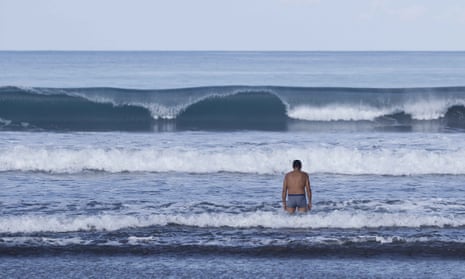I’d been aware, for a while, that wealthy friends had resumed travelling, and a few months ago – in the first flush of vaccination optimism and with Covid rates in New York plunging – it looked easy. Perhaps we can do this, I thought. Countries reliant on tourism dollars were reopening. Airline prices were still low. It was, I told myself, safer to go to Costa Rica than to Florida. If JetBlue thought it was OK to travel to San José, then that was good enough for me. Besides which, I thought, with stubborn servility, if it really was dangerous to fly to Central America, the US government wouldn’t let me do it. (Ha.)
That was in late March. Last summer we had, along with everyone else lucky enough to be able to leave the city, rented a minivan and, after driving north for three hours – the minimum journey required to clear the extraordinary inflation-hitting resort rates near New York – sat out August in a house in Massachusetts. There was no question of flying to England or anywhere else, and if we missed seeing friends and family, there was some consolation in having that option removed. Of course, people still flew last summer. But their circumstances were generally so different from our own that it removed the pain of decision-making.
It’s different this year. The process of settling on a level of risk tolerance is murkier. I’m fully vaccinated, but my kids aren’t, although on the other hand they’ve been sitting in a class with 20 other kids for weeks, with zero transmission. Vaccination rates in the US are soaring. Mask requirements have been dropped for people outdoors. Everything is open. We’re done, right? OK, we’re done.
This is, clearly, not an entirely reality-based shift, but a psychological response to lockdown fatigue – and something else, too, to do with our understanding of basic narrative structures. A few weeks ago, before the weather turned, it seemed impossible to imagine this summer would be the same as the last, not because the world was in better shape, but because 18 months of extraordinary events seemed the absolute limit of a credible storyline. This wasn’t, surely, going to drag on into a second summer; that’s not how the blockbuster ends. If the general arc was moving towards recovery we could speed it up simply by reverting to normal.
Anyway, so I didn’t check the Covid numbers in Costa Rica before booking the flights. A friend – different wealth category, different circumstances – had flown to San José a few weeks earlier, and it had been totally fine. We were staying in an apartment, not a hotel, which seemed safer in terms of exposure. Friends were confidently booking flights to England and had been back and forth to the west coast for months. I spent several weeks imagining our July on the beach and wondering whether or not it was too dangerous to go zip-lining.
Eventually, looking through my fingers, I did the bare minimum of due diligence and glanced at the state department website. On the page for Costa Rica, a bright red banner ran across the top bearing the words “Level 4: do not travel.” (The United Kingdom, for contrast, is presently at Level 3: reconsider travel). They’re probably exaggerating, I thought. With a little Googling, I can land on a different outcome. I flipped to the CDC website. Another red banner, another level 4, and the advisory, “travellers should avoid all travel to Costa Rica”. OK, but they haven’t actually banned it, so it can’t be that bad. Further research brought up the kind of chart with a spike in it with which we are all now familiar. According to Johns Hopkins University, at the beginning of May the positivity rate in that part of Central America was higher than that in India and Brazil.
This was a lesson in myopia; small countries suffering outside the glare of attention that attends bigger nations now mired in new variants. The economic pain of a second year of cancelled tourist seasons is, clearly, as serious a threat as that of Covid in many parts of the world and explains the reopening in spite of the numbers.
The decadence of magical thinking, meanwhile – we’re fine over here, so they’re probably fine over there, and even if they’re not we can move in a bubble – can’t survive even the flimsiest engagement with reality. I cancelled the flights and felt a sharper reminder: that there are worse things than another summer at home.
Emma Brockes is a Guardian columnist
This article was amended on 7 June 2021 because a caption sited Jaco beach at Costa Rica’s inland capital, San José.

